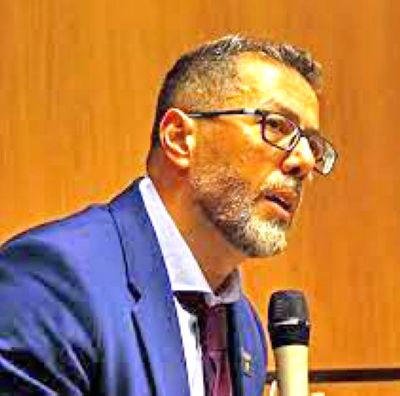The return of one million Palestinians from southern Gaza to the north on January 27 felt as if history was choreographing one of its most earth-shattering events in recent memory.
Hundreds of thousands of people marched along a single street, the coastal Rashid Street, at the furthest western stretch of Gaza. Though these displaced masses were cut off from each other in massive displacement camps in central Gaza and the Mawasi region further south, they sang the same songs, chanted the same chants, and used the same talking points.
During their forced displacement, they had no electricity and no means of communication, let alone coordination. They were ordinary people, hauling a few items of clothing and whatever survival tools they had following the unprecedented Israeli genocide. They headed north to homes they knew were likely destroyed by the Israeli army.
Yet, they remained committed to their march back to their annihilated cities and refugee camps. Many smiled, others sang religious hymns, and some recited national songs and poems.
A little girl offered a news reporter a poem she composed. "I am a Palestinian girl, and I am proud," her voice blared. She recited simple but emotional verses about identifying as a "strong, resilient Palestinian girl." She spoke of her relationship with her family and community as the "daughter of heroes, the daughter of Gaza," declaring that Gazans "prefer death over shame." Her return to her destroyed home was a "day of victory."
"Victory" was a word repeated by virtually everyone interviewed by the media and countless times on social media. While many, including some sympathetic to the Palestinian cause, openly challenged the Gazans' view of their perceived 'victory,' they failed to appreciate the history of Palestine, indeed, the history of all colonized people who wrested their freedom from the claws of foreign, brutal enemies.
"Difficulties break some men but make others. No axe is sharp enough to cut the soul of (someone) armed with the hope that he will rise even in the end," iconic anti-apartheid South African leader Nelson Mandela wrote in a letter to his wife in 1975 from his prison cell. His words, written in the context of South Africa's struggle, feel as if they were written for Palestinians, especially Gaza's latest triumph against erasure, both physical and psychological.
To understand this better, examine what Israeli political and military leaders said about northern Gaza immediately after the start of the genocidal war on October 7, 2023:
Israel will maintain “overall security responsibility" for the Gaza Strip "for an indefinite period," said Israeli Prime Minister Benjamin Netanyahu in an interview with the ABC News network in November 2023.
One year later, the Israeli army reiterated the same sentiment. In a statement, Israeli Brigadier General Itzik Cohen told Israeli reporters that there would be "no return" for any residents of northern Gaza.
Finance Minister Bezalel Smotrich went further. “It is possible to create a situation where Gaza’s population will be reduced to half its current size in two years,” he said on November 26, stating that Israel should re-occupy Gaza and “encourage” the migration of its inhabitants.
Many other Israeli officials and experts repeated the same notion like a predictable chorus. Settler groups held a conference last June to assess real estate opportunities in Gaza. In their minds, they were the only ones with a say over Gaza's future. Palestinians seemed inconsequential to the wheel of history, controlled, as the powerful arrogantly believed, by Tel Aviv alone.
But the endless mass of people sang, "Do you think you can measure up to the free, measure up to the Palestinians?.. We will die before we surrender our home; they call us the freedom fighters."
Many media outlets, including Israeli ones, reported a sense of shock in Israel as the population returned en masse to a fully destroyed region. The shock does not end there. Israel failed to occupy the north, ethnically cleanse Palestinians from Gaza, or break their collective spirit. Instead, Palestinians emerged stronger, more determined, and, equally frightening for Israel, with a new objective: returning to historic Palestine.
For decades, Israel invested in a singular discourse regarding the internationally recognized Palestinian Right of Return to their homes in historic Palestine. Almost every Israeli leader or top official since the 1948 Nakba (the 'Catastrophe' resulting from the destruction of the Palestinian homeland) echoed this. Former Israeli Prime Minister Ehud Barak summarized it in 2000 during the Camp David negotiations, when he drew his "bottom line" in any peace deal with the Palestinians: there would be no right of return for Palestinian refugees.
As Gaza has proven, Palestinians do not take their cues from Israel or even those who claim to represent them. As they marched north, four generations of Palestinians walked together, at times holding hands, singing for freedom and return, not only to the north but further north to historic Palestine itself.
Since the Nakba, Israel has insisted it will write the history of the land between the Jordan River and the sea. But Palestinians continue to prove Israel wrong. They survived in Gaza despite genocide. They remained. They returned. They emerged with a sense of victory. They are writing their own history, which, despite immeasurable and unimaginable losses, is also a history of hope and victory.
Ramzy Baroud is a journalist, author and the Editor of The Palestine Chronicle. He is the author of six books. His latest book, co-edited with Ilan Pappé, is ‘Our Vision for Liberation: Engaged Palestinian Leaders and Intellectuals Speak Out’. His other books include ‘My Father was a Freedom Fighter’ and ‘The Last Earth’. Baroud is a Non-resident Senior Research Fellow at the Center for Islam and Global Affairs (CIGA). His website is www.ramzybaroud.net
